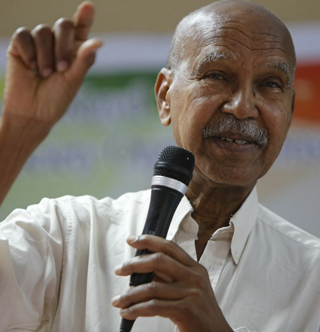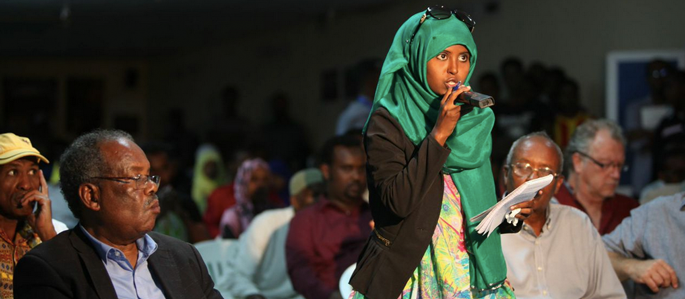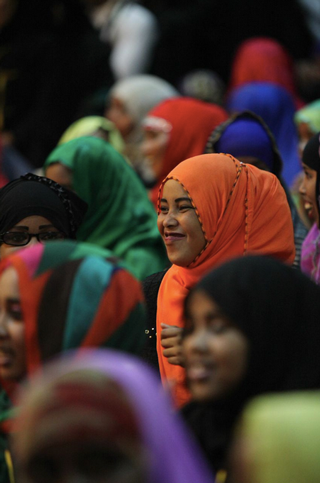The Hargeysa International Book Fair, which took place in Somaliland’s capital over a week in August, has been an annual event for the past seven years, growing in size and regional importance.
The theme of this year’s fair was ‘imagination’. Somaliland—a functioning state since its declaration of independence from Somalia in 1991, but still internationally unrecognised—has itself been labelled as “an imaginary country”. As a former first lady and foreign minister of Somaliland, Edna Adan Ismail noted at the opening of the Hargeysa Cultural Centre, imagination and creativity are what the people of Somaliland have employed to overcome their post-war challenges.
The fair is directed by Jama Musse Jama of the Red Sea Cultural Foundation who founded the event in 2008 when he realised “there was no space to sit down and simply debate.” The book fair, he says, is a “place for ideas to circulate.” Since 2008, with co-organiser Ayan Mahamoud of Kayd Arts and Culture (who organises the annual Somali Week in London each October), and a range of volunteers and supporters, Jama Musse has made the fair a regular annual event, a festival of ideas and performance where local and international guests cross political boundaries.

The week of the fair also saw the launch of the Hargeysa Cultural Centre, where the opening ceremony of the fair took place. The Cultural Centre is also a venture of the Red Sea Cultural Foundation, undertaken in collaboration with the Rift Valley Institute and supported by the European Union.
The opening speaker at the fair this year was Nuruddin Farah, the Somali writer whose fourteen novels have earned him recognition as a giant of African literature. Long in exile from his country, Mr Farah challenged the audience on what he perceived as the “inherent cruelty” of Somali society. Somali history, he declared, was “the consequence of that cruelty… I have come to start a debate with my community.”
His opening address provoked a strong reaction from the crowd, setting the tone for the week, with audience members questioning the negative tone of the international portrayal of Somali issues, and wondering how Somalis themselves should respond.
The subjects of subsequent sessions included Somaliland’s high levels of maternal and infant mortality (a session introduced by Edna Adan Ismail, the former First Lady and founder of the Edna Adan Maternity Hospital) and the issue of female genital mutilation. There was discussion of the preservation of Somali culture and heritage and of the problems of state-building and political transformation, and an analysis of Western media portrayal of Africa and Africans. The discussions took place both in English and Somali.
One of the most eagerly anticipated sessions was the launch of the paperback edition of The Orchard of Lost Souls, a novel by the UK-based Somali writer Nadifa Mohammed, who drew on her female relatives’ experiences during the 1980s Somali civil war.

The RVI hosted several panels. One showcased the poetry of Saado Cabdi Amarre from Somaliland, Norah Lungu from Malawi, the Kenyan poet Phyllis Muthoni, and Elizabeth Spackman from the USA. Another panel under the title of “Imagined Communities” included Billy Kahora, editor of the Kenya-based magazine Kwani, and Ugandan analyst Fred Galooba-Mutebi. The Somali-Italian writer Igiaba Scego, whose works dwell on the intricacies of living between cultures, declared that she felt sometimes that she ‘translates herself.’
The Red Sea Foundation also works to develop local talent, hosting writing and photography workshops and readers’ clubs as part of the fair. According to Jama Musse, over a hundred new publications in Somali language were available this year.
Guests from Europe, America and neighbouring African countries included a delegation of authors from Malawi. The fair culminated in a unique meeting of oral cultures, in a joint performance by the acclaimed Somali poet Maxamed Ibraahim Warsame, known as Hadraawi (‘master of speech’) and the Malawian poet Jack Mapanje, both of them former political prisoners in their respective countries.

The festival is currently riding a wave of international interest in new African literature. And for Jama Musse Jama, such events locate Somaliland within a larger, distinctly African context, rather than the Middle East and the wider diaspora to which Somalis have historically looked. Inspiration from other African countries came from Muthoni Garland, a Kenyan writer and educator, who has led an initiative to establish school libraries across her native land, and Nigerian novelist, poet and publisher Chuma Nwokolo.
Not all worked perfectly. Advertised sessions stretched beyond their allocated time; some mysteriously disappeared. There was a visible separation in the room, with international guests, local persons of influence and those from the diaspora to the front and others to the back. There was a sense that the fair is outgrowing itself; the organisers worry that security issues and space limitations are restricting participation.
Despite these anxieties the book fair and the cultural centre look set to go from strength to strength. The Somaliland government’s National Vision for 2030 stresses the importance of cultural tradition in Somaliland’s national development. And for 2015, the organisers are planning to have Nigeria as the featured guest country.
Meanwhile, says Jama Musse, “If we have one more reader at the end of the fair, we have succeeded.”



